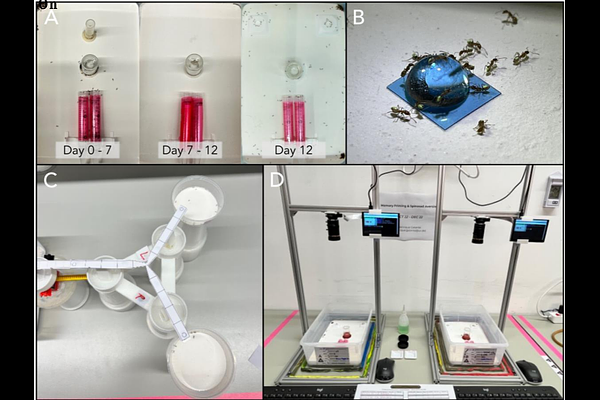Invasive ants fed spinosad collectively recruit to known food faster yet individually abandon food earlier

Invasive ants fed spinosad collectively recruit to known food faster yet individually abandon food earlier
Galante, H.; Forster, M.; Werneke, C.; Czaczkes, T. J.
AbstractCurrent management strategies applied to invasive ants rely on slow-acting insecticides which aim to delay the ant\'s ability to detect the poison until its effects are noticeable. Despite this, most control efforts are unsuccessful, likely due to bait abandonment and insufficient sustained consumption. Conditioned taste aversion, a learned avoidance of a particular taste, is a crucial survival mechanism which prevents animals from repeatedly ingesting toxic substances. However, whether ants are capable of this delayed association between food taste and subsequent illness remains largely unexplored. Here, we exposed colonies of the highly invasive Argentine ant, Linepithema humile, to a sublethal dose of the slow-acting insecticide spinosad. We combined measurements of individual-level feeding patterns with quantification of collective preferences and foraging dynamics to investigate the potential effects of the toxicant on behaviour. Collectively, ants preferred an odour associated with a previously experienced food, even if this contained spinosad, over a novel one. However, at the individual-level, previous exposure to spinosad resulted in reduced food consumption, as a consequence of earlier food abandonment. Moreover, while control-treated colonies recruited slower to a food source which tasted like a previously experienced one, spinosad-exposed colonies recruited equally fast to both novel and familiar foods. Although it appears that ants are unable to develop a conditioned taste aversion to sublethal doses of spinosad, ingestion of even small amounts of the toxicant strongly influences foraging behaviour. Understanding the subtle effects of slow-acting pesticides on ant cognition and behaviour can ultimately inspire the development of more efficient control methodologies.